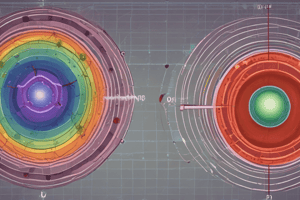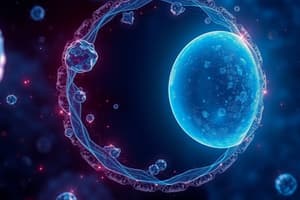Podcast
Questions and Answers
What are Cadherins?
What are Cadherins?
A diverse family of adhesion molecules
Desmosomes give epithelia mechanical strength.
Desmosomes give epithelia mechanical strength.
True (A)
What do tight junctions form?
What do tight junctions form?
A seal between cells and a fence between plasma membrane domains
What is a Gap-Junction Connexon composed of?
What is a Gap-Junction Connexon composed of?
What is the role of Integrins?
What is the role of Integrins?
Glycosaminoglycan (GAG) chains occupy only small amounts of space.
Glycosaminoglycan (GAG) chains occupy only small amounts of space.
What are the major proteins of the extracellular matrix?
What are the major proteins of the extracellular matrix?
What happens to Integrins in genetic diseases?
What happens to Integrins in genetic diseases?
Integrins can only exist in an active conformation.
Integrins can only exist in an active conformation.
Flashcards are hidden until you start studying
Study Notes
Cell Cycle and Cell Death
- The cell cycle consists of phases that lead to cell division and replication.
- Cell death can occur through various mechanisms, including apoptosis and necrosis.
Cell-Cell and Cell-Matrix Junctions
- Cadherins form a diverse family of adhesion molecules crucial for cell-cell adhesion.
- Cadherin-dependent cell-cell adhesion is vital for organizing developing tissues.
- Epithelial-mesenchymal transitions (EMT) are influenced by the regulation of cadherins.
- Catenins connect classical cadherins to the actin cytoskeleton, providing structural integrity.
Types of Cell Junctions
- Desmosomes enhance the mechanical strength of epithelial tissues.
- Tight junctions create seals between cells and delineate plasma membrane domains, preventing leakage.
- Gap junctions consist of connexons made from six connexin subunits, facilitating intercellular communication.
- Selectins facilitate transient cell-cell adhesions within the bloodstream, playing a role in immune response.
- Members of the immunoglobulin superfamily promote Ca²⁺-independent cell-cell adhesion.
Extracellular Matrix (ECM)
- The extracellular matrix is synthesized and organized by the cells residing within it, providing structural and biochemical support.
- Glycosaminoglycan (GAG) chains fill large volumes and form hydrated gels, crucial for tissue morphogenesis.
- Hyaluronan serves as a space filler during tissue development and repair processes.
- Collagens are the primary proteins present in the ECM, contributing to tissue strength and support.
- The basal lamina represents a specialized form of the extracellular matrix, underlying epithelial tissue.
- Integrins function as transmembrane heterodimers that connect the extracellular matrix to the cytoskeleton, facilitating communication between the two environments.
- Defects in integrins can lead to various genetic diseases, highlighting their importance in cellular function.
- Integrins can transition between active and inactive states, influencing cellular responses to external signals.
Studying That Suits You
Use AI to generate personalized quizzes and flashcards to suit your learning preferences.




